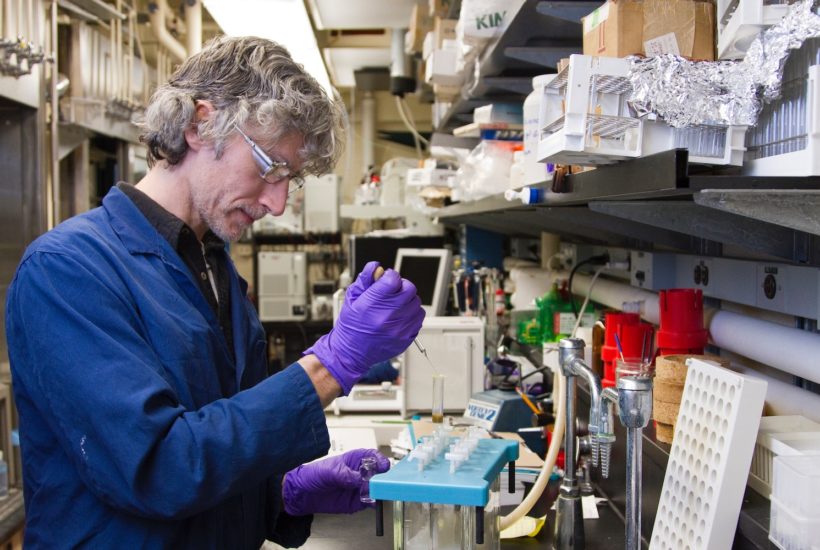Biotech
European biotech firm BioNTech to create individualized cancer treatments
The Mainz-based company BioNTech develops individualized cancer drugs. The company has raised billions of U.S. dollars on the U.S. technology exchange Nasdaq. BioNtech is a rarity, as Germany lacks the financial system to fund biotech companies, and developers are afraid to take risks on new biotech companies.

“Goldgrube 12” is the address of BioNTech in Mainz. This once small company is now regarded as a beacon of the German biotech industry. The company, co-founded by oncologist Ugur Sahin, develops individualized cancer drugs. Through rounds of financing, cooperation with pharmaceutical companies and a listing on the U.S. technology exchange Nasdaq in October, BioNTech raised over $1.4 billion. The prospects for the German biotech sector as a whole, however, are assessed less positively by experts.
“We don’t want to develop individual drugs, but we have a completely new approach,” said Sahin, who was awarded the German Cancer Prize in 2019. “Our goal is to develop individualized therapies tailored to the cancer of each individual patient.”
Until now, it has been common practice to limit the tumor diagnosis of a patient to individual characteristics and to derive therapeutic decisions from these. Individual characteristics of the disease would only be roughly recorded. BioNTech is focusing on “next-generation sequencing,” a technology that can record the analysis of billions of genetic features in the human genome and changes in cancer—a completely new method.
“You can compare that to Tesla,” said Sahin. The entire innovation chain, including the production of large quantities, has to be set up. “Only, at BioNTech the level of individualization is much higher. If this works, it will give us an enormous advantage over our competitors. Currently, BioNTech is treating patients with late-stage cancer, cases in which the disease is rarely curable. However, the trend is towards an earlier diagnosis of even the smallest metastases with blood tests.”
Stay informed on the latest biotech advances with Born2Invest. Our companion app includes news updates of finance headlines from business and investing in cannabis, Africa, fin-tech, and more.
Siegfried Bialojan, a biotech expert at the consulting company EY, considers BioNTech to be a “beacon” of the German biotech sector alongside Qiagen, Evotec, or Morphosys. But these lighthouses are not very representative of the segment as a whole. In terms of breadth, the industry falls far behind, although the potential in this country is “enormous” in view of the strong research landscape. “Against this background, little is happening,” criticized Bialojan. Despite billions in research funding, little added value has resulted.
Germany lacks a financing ecosystem
The fact that BioNTech chose the path to Nasdaq is no coincidence for Bialojan. “There is a race of investors in the U.S. saying: We are betting on the future.”
Germany lacks a functioning financing ecosystem. Biotech companies are concerned with new developments with high risk, long lead times and immense capital requirements, in contrast to IT or other tech companies, where products are developed more cheaply and reach the market within a shorter time.
This biotech constellation can only be financed with equity capital, not with money borrowed from banks. In Germany, however, there is rather a very pronounced debt capital culture. There is also a lack of risk-taking and powerful venture capital funds, i.e. funds with venture capital.
__
(Featured image by National Cancer Institute via Unsplash)
DISCLAIMER: This article was written by a third party contributor and does not reflect the opinion of Born2Invest, its management, staff or its associates. Please review our disclaimer for more information.
This article may include forward-looking statements. These forward-looking statements generally are identified by the words “believe,” “project,” “estimate,” “become,” “plan,” “will,” and similar expressions. These forward-looking statements involve known and unknown risks as well as uncertainties, including those discussed in the following cautionary statements and elsewhere in this article and on this site. Although the Company may believe that its expectations are based on reasonable assumptions, the actual results that the Company may achieve may differ materially from any forward-looking statements, which reflect the opinions of the management of the Company only as of the date hereof. Additionally, please make sure to read these important disclosures.
First published in t3n, a third-party contributor translated and adapted the article from the original. In case of discrepancy, the original will prevail.
Although we made reasonable efforts to provide accurate translations, some parts may be incorrect. Born2Invest assumes no responsibility for errors, omissions or ambiguities in the translations provided on this website. Any person or entity relying on translated content does so at their own risk. Born2Invest is not responsible for losses caused by such reliance on the accuracy or reliability of translated information. If you wish to report an error or inaccuracy in the translation, we encourage you to contact us.

-

 Impact Investing2 weeks ago
Impact Investing2 weeks agoBNP Paribas Delivers Record 2025 Results and Surpasses Sustainable Finance Targets
-

 Impact Investing4 days ago
Impact Investing4 days agoCDP Approves €1.5 Billion Package to Boost Industry, Renewables, and International Development
-

 Crypto2 weeks ago
Crypto2 weeks agoUniswap and BlackRock Partner to Launch BUIDL in DeFi
-

 Biotech7 days ago
Biotech7 days agoNew Molecular Clues Explain Aggressive Neuroblastoma and Point to Targeted Treatments

























